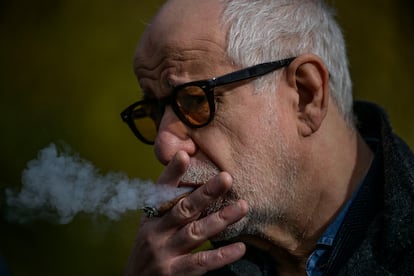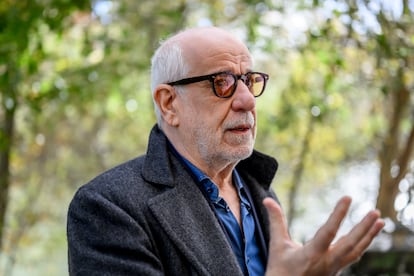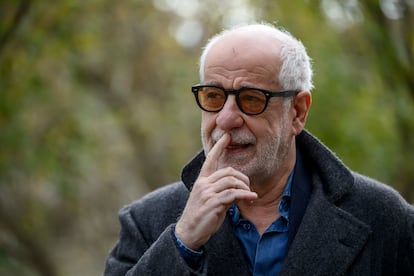Toni Servillo (Afragola, 1959) agrees to talk this Friday in Rome taking a walk along the banks of the Tiber, like Jep Gambardella, the character he played in The great beauty (Paolo Sorrentino, 2013), the film that made him famous throughout the world. He is going to the Estación Alta festival in Girona on November 29, and then to the Teatro de la Comedia in Madrid, from January 23 to 26, with his last theatrical show, Three ways not to die (Three ways not to die) by Giuseppe Montesano. He goes on stage alone and reads texts about three milestones of Western culture: Baudelaire, Dante and the Greek classics. He does it because he feels an urgency to do something radical right now.
Ask. What would be these three ways to not die?
Answer. In Baudelaire’s case, the search for beauty to overcome injustice and depression, which makes us dead in life. In Dante, this imagination is so active that it makes him enter hell, purgatory, alive. And the Greeks are those who with clear and naked thinking mastered the future with extraordinary advancement, imagining that the world and the mind are connected. And this is what the work wants to invite us to, to recover this human sense of being in the world. We especially address young people so that they recover the most important roots of our culture. It is an act of cultural resistance, we have the duty to distance young people from the illusion of approximate, false and comfortable knowledge.
P. What attracts you to Baudelaire? He seems very un-Italian: self-destructive, misfit, on the margins of society, explores ugliness.
R. Because Baudelaire, through beauty, fought against injustice and depression. He went to the barricades in 1848, inviting us to accept our transformations to move towards the new. And discovered in depression, in the call spleenan extraordinary creative opportunity. And then Baudelaire already denounced problems that we now have. He says, for example, this phrase: “We will face a world that will have us so Americanized that every spiritual aspect of our existence will be considered immensely ridiculous.” He says it in a book that is not coincidentally titled The capital of the monkeys.
P. What does it feel like to act in your language and see that the audience is equally excited?
R. Yes, it is exciting, because long before communications existed, traveling theater companies anticipated the meaning of Europe. Theater has never known borders, communicating the same condition: that we are men, that we are passing through this land, and that is why we seek solidarity, consolation, encounter. Above all, theater seeks to enhance the wonderful uniqueness of each of us in diversity. When I was a child and there were still no subtitles, I remember going to international theater festivals, and seeing the Berliner Ensemble, the Russian actors, I didn’t understand anything, but I came away with a deep feeling of shared humanity, which is what always gives theater its unrepeatability. The strength of theater is that it places the spectator and the actor in the same shared time. Something that has a beginning, a middle and an end. Then you take what you have seen in your heart and return to it, reworking it from a distance, with an emotion that has been unique, to which you cannot return except by watching the show again, and the show will be different from the day before.
The world seems to need infinite entertainment, and theater does not play with an aspect of cinema that is also beautiful, that of creating an experience of an illusory nature. Theater is a clash, between the actor and the spectator. The origin of theater, from the Greeks to the present day, is an assembly-based origin. We meet in a place, alive, to reflect, as living people, and put a mirror in front of ourselves.
P. Regarding the wandering companies, for example, the figure of Harlequin actually comes from northern Europe, the first time he appears in Italy is with Dante, he summons him to hell, like a comic devil.
R. Yes, I like to think that Harlequin’s origin is animal, that Harlequin is actually a cat, that he has speed of movement and is cunning. What I want to say is that the theater of Commedia dell’arte He didn’t need words to make himself understood. It proved this human closeness that makes us all equal. Even today the theater comes to your home. That is, I go to Girona, to Madrid, I take a plane and go in person. This is of enormous importance and more so today than in the past. It is an art that, like poetry, is disappearing. In Italy, those who buy poetry books are mainly women. And they are the ones who go to the theater the most. If they stopped doing it, the theaters would close. The intelligence of the feminine heart makes theater and poetry resist.
P. He has chosen a naked staging, with total confidence in the power of simple words.
R. Completely. Precisely for the reasons that we are saying, and taking into account the general situation in which we find ourselves, I have felt the need, after 43 years of theater and 40 films, and to delve into that wonderful game between fiction and reality, I felt the need, I said, to return to a theater of origins, in a ritual form. That is, convening the public around a fire, which are the fundamental texts of Western culture, and bearing witness to it like Toni.
P. Throwing away the mask.
R. Throwing off the mask completely for a moment. The audience has the feeling of an encounter with an actor. The show is an interpretive test, but whoever interprets that text is not a character, it is an actor who testifies through those words to a condition in which we all find ourselves. When I perform this show it is as if I think about the great performers, for example, of the piano. Sviatoslav Richter who plays Schubert with the score, but testifies to his happiness when interpreting that wonderful music. That is, at this moment I need to skip the fiction dimension. Also because today the discussion between reality and fiction is much more complicated than before.

P. As an actor he has known success at a certain age. When it arrived, was it as expected?
R. Look, I’m already 65 years old, I’ll be honest: I’ve never looked for success. As a child I believed that I would work in the theater all my life, with the objectives we are talking about. And they are the ones I continue to pursue. Cinema came into my life when I was a man, I was already 40 years old, I didn’t imagine that I would enter that world of glamour, I don’t give a damn. I still live in the provinces, in Caserta, near Naples, I come to Rome periodically. I have never done advertising in my life. When cinema arrived, I always did theater at the same time. It’s what I do, I was touring Europe and it was Jep Gambardella.
P. A character who has become an icon.
R. Yes, in fact, what excites me most is that, for the younger generations who know me through that character of missed opportunities, of complacent decadence, Gambardella is precisely the opposite of what I do in the theater.
P. Although he was a dandy, like Baudelaire.
R. Practically yes, but in the worst sense, because Baudelaire’s own friends are surprised to see that man dressed in black with pink gloves take a rifle at the barricades in 1848.
P. Something Gambardella would never have done.
R. Never! I have never sought success, divinity. I have always kept myself safe because theater keeps me protected. It gives me balance. A show that doesn’t go well one night is such a frustration for an actor that it will never give you the feeling of having already achieved everything, it always puts you at stake. And I am also lucky to be Neapolitan. Naples is a city that keeps you safe from narcissism. You leave a theater, you have had great success, and you are in a city that is a world so complex, so rich, that you feel a part of the whole.
P. He has never left Naples. Many yes.
R. One reason is what I said, Naples is a city that does not make you feel like a protagonist, as if you had the feeling of always being indebted to it. Two: the language. I have never said a word in Italian with my parents, I always spoke in Neapolitan. To deeply understand certain things that concern the most sincere part of ourselves, I need my language. And Neapolitan is a theatrical language par excellence, it contains in itself instructions on how to behave physically. And this from a theatrical point of view is an enormous wealth. Third reason, I believe that the more tied one is to one’s roots, the more open one is to encountering those who are different. The opposite of separatists, of nationalisms.
P. In Italy there is a stage talent for interpreting situations among ordinary people. And it also gives the feeling that you really don’t know where it is.
R. Yes, yes, there is a definition of an anthropologist for Neapolitans: they have a recited social behavior. It is in the nature of the Neapolitan to see himself live. This is good for those who do my work. But many times it can also be evil, it can be used for negative purposes, that is, never showing…
P. Hide behind the mask.
R. Exact. We also know to what extent life is made of masks and illusions, Neapolitans have an extraordinary and ironic attitude towards life. They even treat death with great familiarity. Being born in Naples for an actor is a great fortune.

P. It is said that Italian actors move between two extremes of reference, Marcello Mastroianni and Gian Maria Volonté. Where are you?
R. I of course do not place myself at all between these two giants. Mastroianni is physically, biologically Chekhovian, it seems that everything comes easily to him, he has an ability to describe an extremely close human condition, we feel him like a friend, like a brother, like a father. In my opinion, his naturalness comes above all from an attitude he already had towards life. Volonté is the opposite. It is the obsession with documentation, preparing, never getting out of character until the work is finished, it was like a pregnant woman who gives birth after nine months. He gives birth to the character, it is a birth. They are two actor’s ideas. In the case of Mastroianni, serene, as happy, childlike as a child playing the most beautiful game in the world. And on the other hand, Volonté is obsession, maceration, pain. There are two models. I, due to my limits of character, greatly envy Mastroianni’s condition, which is unattainable for me, and I tend to work like Volonté.
P. In The sweet lifeMastroianni before entering the Trevi Fountain says: “We were wrong about everything.” It’s actually a very dark movie. In many Italian films this evil of living is explored, not knowing where the character and the entire country lost their way, looking for a recipe for living. Like in your show.
R. Yes. Fellini, who is universally recognized as the director of the most unbridled fantasy, actually offered in some of his films a lesson in the anthropology of the Italian and of Italy, of that malaise, and all great Italian cinema does so.


